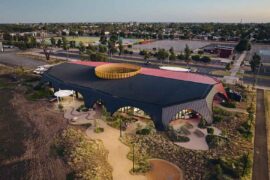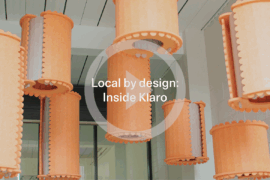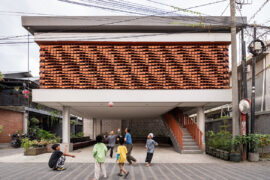Located in the picturesque county of Anji, Alila Anji is a new eco-luxury resort where guests can experience simple and healthful country living. Cristina S.K. writes.

May 4th, 2016
Contrasting with the hustle and bustle of Chinese cities, Anji County in the province of Zhejiang offers a natural green haven characterised by its extended bamboo forests and abiding calm. Opening in June, Alila Anji will be the first Chinese outpost from the Singapore-based luxury hotel group Alila. Appealing to travellers keen to find serenity within natural vistas, the hotel is set atop a hillside overlooking Tianfu lake, close to lush bamboo groves and white tea plantations, a worthwhile four-hour drive from Shanghai.
Although hidden away, the scenery of the nearby Anji Grand National Bamboo Forest became famous in 2000 when it appeared as a dreamy backdrop for the high-flying choreographed fight scenes in the movie Crouching Tiger, Hidden Dragon. Here, in addition to the suppleness of the green bamboo landscapes, one finds the origins of Anji Bai Cha or Anji white tea, throughout its protected harvest areas where the healthy delicate green tea variety (known for the paleness of its leaves) is picked every early spring.
“This project has been a labour of love,” says Alila’s chief marketing officer Doris Goh, who recalls the Commune Hotels & Resorts Regional Office Asia’s team concerted efforts toward the completion of the overall design for the hotel, while working “to conform to the sustainability factor and green construction.” Indeed, in line with its other properties, the brand is setting into place the standards to secure an EarthCheck certification within its first year of opening.
The sustainable features include a notable in-resort water purification system with swales to manage runoff water and pumps to irrigate the neighbouring hill forest. The restaurant is aiming at working closely with the local community in promoting rural tourism and be mindful of a swift farm-to-table ratio, using local pollution-free products, and locally inspired produce such as bamboo shoots, white tea, and alpine vegetables.
The 74 suites and villas have been created to emulate a typical local Chinese village – within a safely gated resort – featuring black shingled roofs and whitewashed walls. Inspiration was drawn from the bamboo forest, with their features appearing in the 200 paintings placed in the guest rooms and public areas. Bamboo as a blueprint element is completed with other locally sourced materials from Anji County such as stone and wood as well as handwoven textiles, silk, and ceramics that together create nesting private outdoor terraces and gardens. While relying on a natural colour palette and comfortable, contemporary designs with Asian touches, every space also offers panoramic glass-views of the peaceful lake or the lush hills – a welcome modern addition for one to take in the natural beauty of the site.
Alila Anji
alilahotels.com/anji
INDESIGN is on instagram
Follow @indesignlive
A searchable and comprehensive guide for specifying leading products and their suppliers
Keep up to date with the latest and greatest from our industry BFF's!

Merging two hotel identities in one landmark development, Hotel Indigo and Holiday Inn Little Collins capture the spirit of Melbourne through Buchan’s narrative-driven design – elevated by GROHE’s signature craftsmanship.

At the Munarra Centre for Regional Excellence on Yorta Yorta Country in Victoria, ARM Architecture and Milliken use PrintWorks™ technology to translate First Nations narratives into a layered, community-led floorscape.
The internet never sleeps! Here's the stuff you might have missed

In an industry where design intent is often diluted by value management and procurement pressures, Klaro Industrial Design positions manufacturing as a creative ally – allowing commercial interior designers to deliver unique pieces aligned to the project’s original vision.

SHAU’s Kampung Mrican revitalisation transforms community life through social architecture, local collaboration and sustainable design.